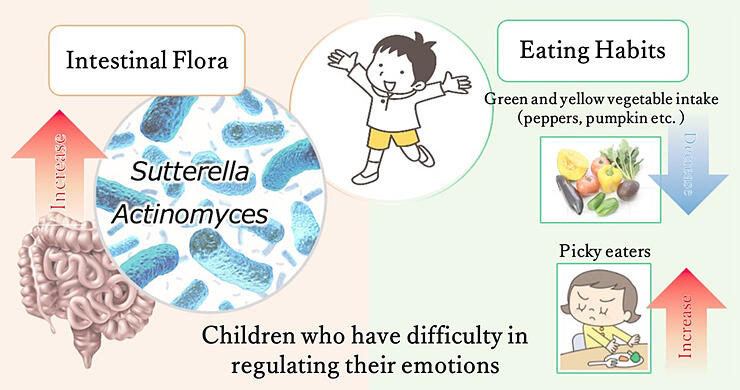A research group led by Professor Masako Myowa and Graduate Student Hideaki Fujihara of the Graduate School of Education at Kyoto University, and Specially Appointed Professor Keisuke Hagihara of the Graduate School of Medicine at Osaka University announced that they have discovered that emotion control in early childhood is related to intestinal flora. They surveyed 257 Japanese children who were 3−4 years-old at the time of study. From this, they determined that the intestinal flora in the children who had difficulty in regulating their emotions contained a higher percentage of inflammation-associated bacteria than that found in the children who did not have emotion difficulties. The group also revealed that the risk of developing emotion regulation difficulty is related to the frequency of intake of green and yellow vegetables and an unbalanced diet. Their results are expected to help toward the support of early childhood cognitive development through dietary strategies. The achievement was published in the September 6, issue of the international academic journal Microorganisms.

Provided by Kyoto University
The higher-order cognitive function that regulates actions and thoughts to achieve a target is called executive function and consists of emotion and cognitive controls. Emotion control governs emotions and desires, whereas cognitive control is responsible for verbalization, reasoning, and execution. In children, a significant development of executive functions is seen at approximately 3−4 years of age (late childhood). This is linked to the rapid growth of the prefrontal cortex at around the same time.
Large-scale long-term longitudinal studies in Europe and the United States have shown that the development of emotion control in childhood is closely related to socioeconomic ability and mental and physical health in adulthood. For example, people who have a low annual income or a difficult family environment in adulthood tend to have had a lower development of emotion regulation in childhood. However, the mechanism responsible for the individual differences in emotion control in early childhood is unknown, and no developmental support method effective for all children has been established.
With the goal of effectively supporting individual children in diverse developmental stages, the research group set out to clarify the biological factors related to emotion regulation. They focused on the existing correlation among the brain, gut and intestinal flora, one of the neurophysiological mechanisms that support physical and mental health and brain function. The basis of an individual's future intestinal flora is determined by the time they are 3−5 years-old, the period that coincides with the development of emotion regulation. Based on this observation, the researchers analyzed the relationship between the development of executive functions and intestinal flora and investigated the influence of dietary habits.
Research on adults has shown that the characteristics of the intestinal flora are associated with mental illness and cognitive function, but information regarding this correlation in early childhood is unknown. In the conducted study, the intestinal flora of 257 Japanese children of 3−4 years-old, who were attending daycare, nursery schools, kindergartens throughout Japan, were evaluated using stool samples and 16S rRNA analysis. The children's parents were asked to provide answers to a questionnaire regarding executive function and dietary habits.
The researchers used BRIEF-P, which is an internationally recognized questionnaire for evaluating executive functions (emotion control and cognitive control). Based on the answers to the questions (63 items) about daily problematic behavior, the children were divided into a regulation difficult and control groups according to criteria established in previous research studies (1.5 standard deviation).
For the answers related to emotion control, 26 and 231 children fell in the difficulty and control groups, respectively. For the answers related to recognition control, 20 and 231 children were in the difficulty and control groups, respectively.
Additionally, the questions on dietary habits focused on the children's frequency of intake of 24 foods within the past week from the date of stool collection and whether they had unbalanced diets.
For the intestinal flora evaluation, the researchers calculated the diversity of microbes in the intestines (species richness and evenness) and the proportion of each type of bacterium among the total bacterial community (occupancy rate).
As a result, they found that the children in the group experiencing emotion regulation difficulty had significantly more inflammation associated Actinomyces and Sutterella species than the children in the control group. These bacteria are known to lead to inflammation in the gut and brain of adults, and their abundance has been found to be associated with psychiatric disorders. Additionally, compared with the control group, the difficulty group had a lower frequency of green and yellow vegetable intake per week and a higher proportion of picky eaters.
However, the researchers found that, among the executive functions, the developmental risks related to cognitive control are not associated with the intestinal flora or dietary habits, whereas emotion regulation is related to these two factors.
Fujihara commented, "The research results we obtained do not allow us to go further into causal relationships. Based on the hypothesis obtained, we plan to proceed with animal experiments to clarify the causal relationship. We believe that a detailed investigation of the relationship between emotion regulation and the intestinal flora in humans is necessary and are currently planning longitudinal analysis to examine how long-term changes in the intestinal flora, emotion regulation and temporal changes in dietary habits influence one another. We believe that intervention studies are necessary in human research, and we would like to develop an individualized cognitive development support strategy that proposes dietary habits tailored to the intestinal flora in each child."
Journal Information
Publication: Microorganisms
Title: Altered Gut Microbiota Composition Is Associated with Difficulty in Explicit Emotion Regulation in Young Children
DOI: 10.3390/microorganisms11092245
This article has been translated by JST with permission from The Science News Ltd. (https://sci-news.co.jp/). Unauthorized reproduction of the article and photographs is prohibited.




